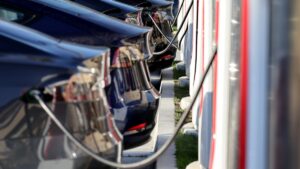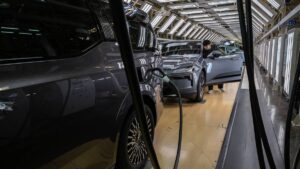Which is the best state for electric vehicles in Australia? Here’s the EV Council’s verdict

The best state for electric vehicles Australia is NSW (image via Getty)
Not too dissimilar to the COVID-19 vaccine roll-out, individual states in Australia are going at it alone on electric vehicles.
But Australia’s Electric Vehicle Council has found that some are ahead of others.
Specifically, it has found that the best state for electric vehicles is New South Wales, giving it a 9/10 score.
Following closely behind was the ACT with an 8 out of 10, then Tasmania and the Northern Territory with a 7. The remainder of governments were at 6 with the exception of the federal government which only got a 3/10.
What makes a state best for electric vehicles in Australia?
In giving New South Wales the top ranking, the council said its policies were “Australia’s best electric vehicle policy to date”.
It described the Electric Vehicle Strategy, only unveiled in June as part of the state budget, as a game-changer. Measures include a $3,000 rebate for the first 25,000 private purchases of EVs and expansion of charging infrastructure across the state.
“That $500m of investment and package of incentives to accelerate the uptake of zero emissions vehicles is finally something comparable with jurisdictions overseas. I know the whole industry is buoyant about the effect it will have on electric vehicle availability and sales,” said EV boss Behyad Jafari.
Jafari also spoke well of the ACT government with its efforts to improve transport electrification as well as individual measures such as tax rebates and free registration.
Although these jurisdictions beat all the others Jafari gave praise to individual states for unique measures.
For instance, Victoria was the first state to introduce a rebate for EV purchases and Queensland’s proposed “Electric Vehicle Super-Highway” would be the world’s longest one of its kind (in a single state).
2021 a good year for EVs, but more leadership needed
Jafari said 2021 was a good year across the nation, noting more EVs (8,688) were sold in the first half of 2021 than the whole of 2020 (6,900).
“When you consider the rhetoric that was being pushed last federal election, the EV discussion in this country has come a long way quite quickly,” he declared.
“The movement across most states and territories is now generally positive and that’s providing greater confidence to private sector investors, which will pave the way for more places to charge and better services to support e-mobility.”
Nevertheless, he criticised the lack of action from the federal government and said we needed to see more EVs at lower price points.
“The chief headwind is, unfortunately, a continued lack of leadership on electric vehicles at the federal level. After promising a national strategy two years ago, the Federal Government has failed to deliver,” Jafari said.
“We need to see more electric vehicle models in Australia, particularly at lower price points. That’s happening slowly, but if we want to accelerate the process and attract the globally limited electric vehicle supply, we need policies enacted at the national level, like fuel efficiency standards.
“Australia has more to gain than most countries on electric vehicles. If [we] transition well we’ll be able to meet our net zero goals, break our dependency of foreign oil, and improve our air quality.”
Related Topics
UNLOCK INSIGHTS
Discover the untold stories of emerging ASX stocks.
Daily news and expert analysis, it's free to subscribe.
By proceeding, you confirm you understand that we handle personal information in accordance with our Privacy Policy.








